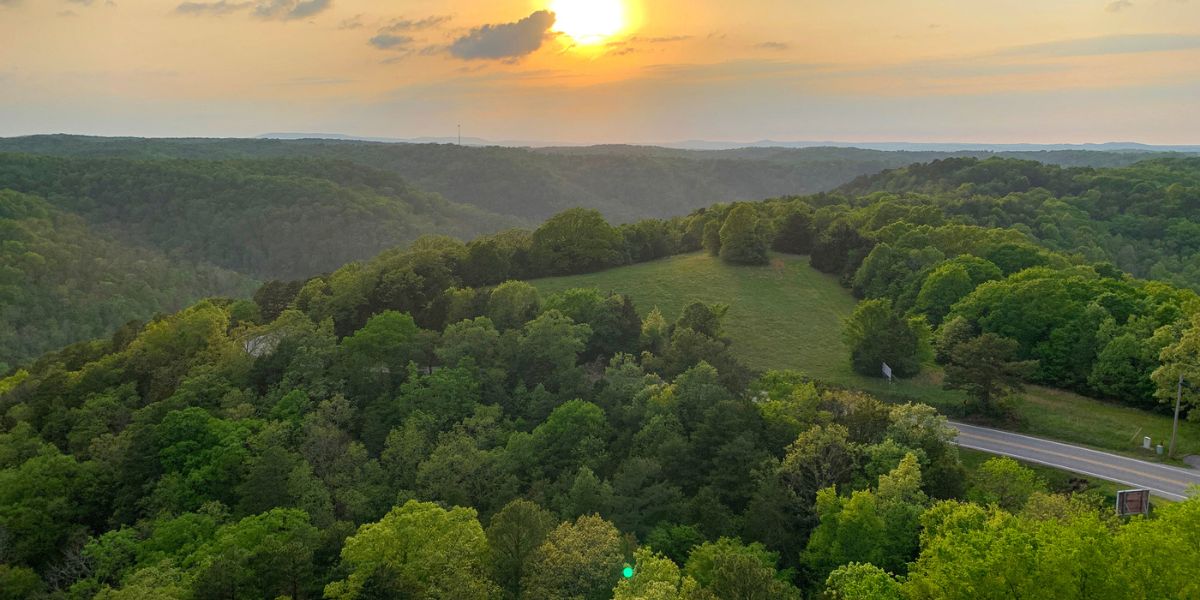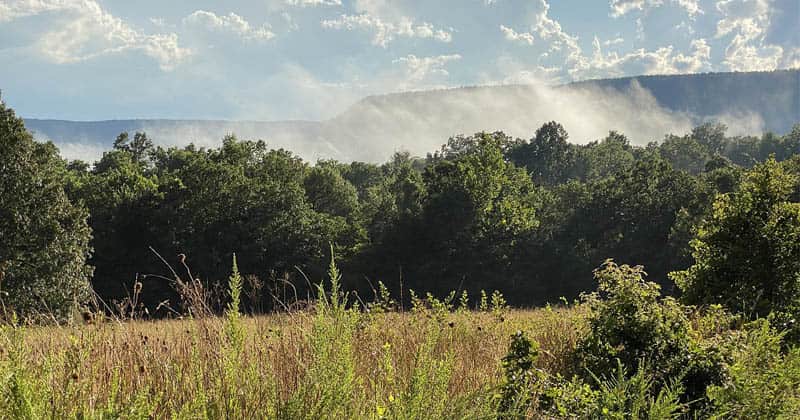Homesteading in Arkansas – What You Need to Know


[ad_1]
Arkansas is rich in rugged beauty and natural resources. It offers some surprising benefits for those hoping to homestead here, but this southeastern state isn’t completely perfect.
So, what exactly should you expect? Read on to learn everything you need to know about homesteading in Arkansas, including the weather conditions, agricultural landscape, and even how to make money from your homestead.
Is Homesteading Legal in Arkansas?
Homesteading is legal in Arkansas. You can garden anywhere, and many rural areas allow livestock. Laws tend to favor property owners and protect personal freedoms, so practicing self-sufficiency here is generally pretty easy.
Arkansas Homestead Laws
Arkansas’ Homestead Exemption Act is great news for homesteaders. Claiming the exemption reduces property values, lessens the tax burden, and ensures that creditors can’t seize your property in the event of bankruptcy. If you don’t qualify for the exemption, you can still claim a homestead tax credit of up to $375.
Is Going Off-Grid Legal in Arkansas?


Going off-grid is mostly legal in Arkansas. The off-grid laws aren’t incredibly stringent but might present issues depending on your goals. Here’s what you need to keep in mind:
- Arkansas residents must comply with local zoning and building codes, which vary widely depending on county and municipality.
- Alternative energy, water, and waste systems are all feasible here, but some operations are restricted and require government oversight.
- People residing in controlled subdivisions must comply with the subdivision restrictions, which may ban livestock, trailers, and certain construction types.
- People living in rural areas without subdivision restrictions are free from most municipal and city ordinances but still must follow county codes and state laws.
Buying Land to Homestead in Arkansas
Your land is your life and legacy. It’s essential to ensure the property you buy fits into your ideal homestead plan and can provide the quality of life you crave.
Cost & Availability
With hundreds of thousands of acres for sale in Arkansas, there’s no shortage of land. The US Department of Agriculture values farmland between $2,850 and $3,600 per acre, while undeveloped land averages $6,739.
Keep in mind that the cost per acre can vary widely. Features like fantastic views, live water, and existing structures tend to increase prices significantly. Inexpensive tracts are common but may have unfavorable conditions or lack infrastructure.
When determining the cost, you’ll also want to consider property taxes. These vary by county, but Arkansas has one of the lowest nationwide averages at just 0.57%.
Quality & Accessibility
Cheap tracts draw many hopeful homesteaders to Arkansas, but not all land is created equal. It’s vital to set eyes on the property before purchasing to determine if it’s worth the money. Here’s what to look out for:
- Soil quality: Many areas of Arkansas have excellent farmland, while other regions have poor-quality soil. If you hope to set up a garden or farm, have the soil quality tested.
- Access: Make sure you can get to the property legally. If you don’t have deeded access, you’ll have to take your neighbors to court before even meeting them.
- Restrictions: Check to see if the land is in a subdivision and get a copy of the restrictions to ensure you’ll be willing and able to comply with them.
- Water: Determine how you’ll get water. Ask about the possibility of digging a well if one is not present or consider an alternative system.
- Perc test: Determine how you’ll manage waste. Ask about a perc test for your septic system and inquire about other methods if the perc test fails.
- Timber: Timber is common in some regions of Arkansas and can be a valuable asset to sell or build with. Examine the quality of your wood and bring in a specialist if necessary.
Best Regions for Homesteading
Arkansas is a diverse state with mountains, flatlands, and river deltas. The best region for you depends on what you want in a homestead.
- Ozark Mountain region: The Ozark Mountains stretch across northern Arkansas with stunning views and diverse terrain. The area is heavily forested, and the soil ranges from shallow and rocky to deep and rich. This region is suitable for orchards, livestock, and timber.
- Ouachita Mountain region: The Ouachita Mountains consist primarily of undeveloped forestland and a few farms. This gorgeous region provides serenity, seclusion, and good-quality pine timber. It is suitable for smaller hobby farms, livestock, and lumber.
- River Valley region: The Arkansas River Valley lies between the Ouachitas and the Ozarks. With high-quality soil, this area is optimal for homesteaders hoping to establish more extensive farms and agriculture. It’s perfect for orchards, vineyards, and vegetable crops.
Renewable Energy in Arkansas
Arkansas is an excellent state for renewable energy. Abundant natural resources and policies like net metering support and protect residents who wish to use renewable energy.
How AR Homesteads Can Generate Renewable Energy
- Solar: Arkansas averages 4.69 hours of peak sunlight daily, making solar energy a very feasible choice. Residents can even claim a federal solar tax rebate. Read more about Arkansas solar regulations.
- Wind: Some parts of the state are at high elevations with lots of wind, and some are in valleys with little wind. Generating electricity via wind can be tricky, and most people use it in conjunction with another method. Read more about Arkansas wind energy regulations
- Alternatives: Alternative renewable energy sources, like biomass and hydroelectric, are less popular but may be viable depending on your chosen region and available resources.
Water Systems in Arkansas
Heavy rains, surface creeks, and underground aquifers make water easy to obtain in most places. You should research your area to determine standard practices and check out our guide on water laws to ensure you stay legal.
How AR Homesteads Obtain Water
- Wells: Arkansas has natural aquifers that make wells popular and feasible for most homesteaders. However, you cannot drill or install your own well system, you must obtain a permit and a get certified contractor to do the job. (Arkansas well water regulations.)
- Surface water: Many properties in Arkansas have live water creeks or springs, and harvesting and using water from them is expected. You can even take water from other places free of charge in certain situations.
- Rainwater: Arkansas gets a lot of rain, especially in the spring. Collecting non-potable rainwater is a prevalent practice and requires no ongoing cost, though restrictions might require you to pay initial system design and permitting fees.
Waste Systems in Arkansas
Not every waste management system can work on every piece of property, so it’s essential to consider a feasible plan before buying your land. Some systems are even illegal, so check out our guide to Arkansas waste laws to learn more about specific regulations.
How AR Homesteads Can Manage Waste
- Septic tanks: Septic systems are the most common for homesteaders here, but they only work if the soil quality is acceptable. Get a perc test before buying land to ensure you can install a septic system.
- Compost toilets: If your land doesn’t perc, you can install a compost toilet. These must be pre-fabricated but are a great option for sustainability and eco-friendliness.
- Incinerator toilets: Incinerator toilets are legal but rarer. They also must be purchased pre-fabricated, and the cost may vary widely.
Garbage Disposal in Arkansas
Garbage and yard waste disposal can be an issue in rural areas where trash pickup is unavailable. Some places allow owners to burn yard waste like fallen branches, but it’s up to the municipality.
Burning garbage is also common, but it’s illegal and can damage your land. Instead, head to a waste management center in your county and drop trash off there. You’ll have to pay a fee, but it’s worth it.
Arkansas Natural Disaster Risk
The state isn’t incredibly prone to disasters, but there is still some risk. Severe storms, tornadoes, and floods are the most common issues. You can learn more in our guide to natural disasters in Arkansas. Consider protecting yourself and your assets from natural disasters with the following methods:
Arkansas Climate & Weather
Arkansas has a temperate climate with four distinct seasons. It is characterized by hot, humid summers and mild winters. Temperatures occasionally dip below freezing or climb to over 100° F, but extremes rarely last long.
It’s warm and comfortable most of the year, but proximity to the gulf and numerous mountain ranges can make for some crazy weather. Tornadoes, hurricane fallout, and lightning storms are all common here.
The state might see over 51 inches of rain some years, with brief periods of snow, frost, and hail common in most regions. Snow and ice storms are more common at higher altitudes, and those living in the Ouachitas or Ozarks will experience harsher weather. Here’s an idea of typical average temperatures here:
- Winter: 20°–55° F
- Spring: 50°–80° F
- Summer: 70°–95° F
- Fall: 35°–85° F
Agriculture for Arkansas Homesteaders
Agriculture is a way of life for many Arkansans. The mild weather and fertile soil create prime growing conditions, while the abundance of pastureland makes grazing animals a breeze. Even though most don’t farm on a commercial scale, it’s easy for homesteaders to garden and raise a few animals.
Arkansas Growing Zone
Arkansas has four distinct growing zones ranging from 6b to 8a. The southern part of the state starts at zone 8a and gets gradually cooler, with only a few northern mountain peaks at 6b. All parts of the state are suitable for gardens, and it’s common to see entire neighborhoods planting come springtime.
Because Arkansas is so lush, foraging for wild food is also common. There are many wild edibles homesteaders can take advantage of, ranging from wild herbs like purple dead nettle to seasonal mushrooms, such as morels and chicken of the woods.
Growing Crops
Arkansas has over 14 million acres of working farmland. That’s nearly half the state! The most common crops include soybeans, rice, corn, wheat, and cotton. Even if you’re not interested in large-scale farming, you can still use favorable gray-water recycling laws and rainwater collection rules to set up clean irrigation systems for a cottager garden.
The culture in Arkansas is very plant focused, and municipalities generally encourage gardening. Because of the mild climate, planting occurs from early spring to late summer.
Common vegetables include tomatoes, cucumbers, okra, peas, and many more — take a look at this planting calendar to get an idea of what you could be growing.
Raising Livestock
Most regions of Arkansas are great for raising livestock. Hay is abundant, the weather is excellent, and even mountainous areas can be suitable for pasture. Farmers raise cattle, fowl, hogs, and goats with relative ease.
Regulations on domestic “backyard” livestock are highly location dependent. Different municipalities have different rules for the type and number of animals you can have.
For example, many areas ban hogs and cows but allow chickens. It all depends on where you are, so research your city or subdivision covenants to see what you can do.
Making Money From Your Arkansas Homestead
Working towards an income-producing homestead promotes a lifestyle of long-term sustainability. Luckily, Arkansas has the culture and legislation to help you make money with your land and ensure your financial future.
Selling Produce & Plants
Arkansas has an abundance of farmer’s markets during the season. These are regulated at both the state and county level, and you usually need to ask for a permit application at the courthouse to set up a booth. If there’s no farmer’s market where you live, roadside booths, local stores, and online sales are common alternatives.
The state has relaxed regulations on selling homegrown produce. You can sell fresh, whole fruits and vegetables without permits or government oversight.
Plants and bulbs are slightly more regulated, and you might need a permit depending on the plant’s type and age. However, the process is easy and feasible for anyone who grows vegetables.
Selling Livestock & Meat
There is a high demand for farm-fresh meat in Arkansas. Selling meat could be lucrative and provide income outside of the growing season, but you must comply with all local and state laws to make it work.
This involves a fair bit of government inspection and oversight. Meat by-products are also regulated. You can sell eggs without a permit, but you can never sell raw milk or cheese.
There is also a market for live chickens, goats, and smaller backyard animals. You cannot sell them publicly, but you may be able to sell them from your own property. Regulated auctions are another good option, and you can contact the Arkansas Department of Agriculture to register your animals.
Selling Crafts & Homemade Products
Homemade crafts and wares like clothing, knickknacks, and jewelry are popular here. People sell the most during the summer tourist season, but flea markets, swap meets, and weekend craft shows go on even in the dead of winter. Most are easy to join and don’t require any permits.
What if you’re only crafty in the kitchen? The Food Freedom Act of 2021 instituted a new food guide, permitting residents to sell almost any homemade food that isn’t temperature regulated.
Homesteaders with bee hives can market honey, and those with extensive gardens can sell pickled and jarred products year-round for a stable income.
Hunting in Arkansas
Hunting, fishing, and trapping help homesteaders practice self-reliance and live more sustainably.
Fortunately, harvesting fish and game is legal and encouraged in designated areas of Arkansas. Deer, hog, duck, and turkey are the most popular, though exotic game like bear and alligator are also available.
Check out the Arkansas game commission to learn more about hunting and to purchase the appropriate permits.
Homeschooling in Arkansas
Arkansas has pretty relaxed homeschooling laws. There are no educational requirements to be a homeschooling teacher. All parents must do is send proper notice to their local school. The government does offer some level of support and quite a few resources for parents wishing to homeschool, but paying for all the school materials is still the parent’s responsibility.
Healthcare in Arkansas
Healthcare availability can make a tremendous difference in your quality of life. Arkansas does have some rural health programs, and most counties have at least one critical-access hospital. That being said, Arkansas rural healthcare is spotty, and it can take hours to receive critical care in many areas.
It’s vital to research the county where you live to determine your healthcare options. Find out how long it will take you to access the nearest hospital and look up primary care providers in your region. Getting started ASAP will ensure you get the care you deserve as soon as necessary.
Does Arkansas sound like paradise? Now that you’ve got an idea of what homesteading is like here, you might want to start planning a visit to explore your options in the state!
[ad_2]
Source link
Recent Posts
Dear Diary, It’s Me, Jessica: Part 16
[ad_1] If you're new here, you may want to subscribe to my RSS feed. Thanks…
Google Faces Lawsuit After $5M in Crypto Stolen via Play Store App
[ad_1] A Florida woman, Maria Vaca, has sued Google in a California state court, alleging…
All About Water Purification: A Complete Tutorial
[ad_1] You may need to purify water to make it safe to drink. The process…
Protocol Village: Quai Releases Mainnet-Compatible Devnet, Crunch Lab Raises $3.5M
[ad_1] The latest in blockchain tech upgrades, funding announcements and deals. For the period of…
The Grim New Daily Life in Venezuela
[ad_1] If you're new here, you may want to subscribe to my RSS feed. Thanks…
World’s 3rd largest public pension fund buys $34M MicroStrategy shares
[ad_1] The third-largest public pension fund in the world has just bought nearly $34 million…
